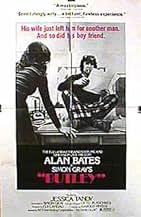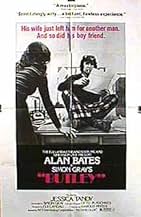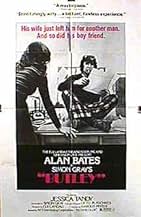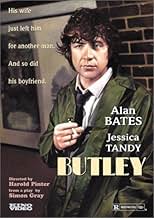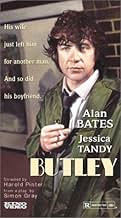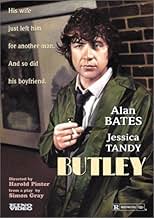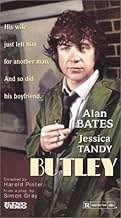An English professor finds his life crumbling around him.An English professor finds his life crumbling around him.An English professor finds his life crumbling around him.
Jill Goldston
- Tube Passenger
- (uncredited)
Lindsay Ingram
- Female Student
- (uncredited)
Anthony Lang
- Tube Passenger
- (uncredited)
Patti Love
- Female Student
- (uncredited)
Belinda Low
- Female Student
- (uncredited)
Derrick O'Connor
- Irishman in pub
- (uncredited)
John Savident
- James
- (uncredited)
Susan Wooldridge
- Female Student
- (uncredited)
Featured reviews
The American Film Theatre was a praiseworthy effort to present classic modern plays to a wide audience. The series petered out when it became clear that there was in fact not enough of an audience to make the venture viable. This left us with a group of films, or rather filmed plays, of varying quality but always interesting, if not only for the wonderful casts assembled for the series. "Butley" was one of the best. After years of oblivion, the series is finally and thankfully being released.
The problem with Simon Gray's very engaging play is that the characters are people one would hardly want to meet. They are a deeply flawed, unlikable bunch. As such we have little sympathy for any of them and hence Gray, intentionally or not, does not allow the viewer to connect emotionally with his characters. He instead allows us to watch as Ben Butley's life slowly disintegrates before our eyes. Despite the enforced detachment, it still remains a fascinating process, thanks to Pinter's precise direction, Gray's very sharp dialogue and Alan Bates delivering an astonishingly virtuoso performance.
It's one of those extremely rare performances in which the actor becomes completely engulfed by the character. It's a feat to behold; almost scary at times. This alone makes "Butley" an unforgettable experience.
The problem with Simon Gray's very engaging play is that the characters are people one would hardly want to meet. They are a deeply flawed, unlikable bunch. As such we have little sympathy for any of them and hence Gray, intentionally or not, does not allow the viewer to connect emotionally with his characters. He instead allows us to watch as Ben Butley's life slowly disintegrates before our eyes. Despite the enforced detachment, it still remains a fascinating process, thanks to Pinter's precise direction, Gray's very sharp dialogue and Alan Bates delivering an astonishingly virtuoso performance.
It's one of those extremely rare performances in which the actor becomes completely engulfed by the character. It's a feat to behold; almost scary at times. This alone makes "Butley" an unforgettable experience.
"Butley" is a film version of the play by the same name that also starred Alan Bates. This is fortunate, as so often when plays are brought to film, the producers completely recast the actors. And, I must say Bates did an amazing job in the lead.
That being said, although Alan Bates did a great job playing a very caustic man, the film itself if probably NOT something most folks will enjoy. He plays a cynical, lazy, nasty alcoholic....the type person you really WOULDN'T want to spend much time with nor build a film around them. In other words, Bates did a great job playing someone you'll strongly dislike...or worse. There really is NOTHING to like about Butley...nothing. And that is why this is an unusual film...very well made but thoroughly unenjoyable after a while.
That being said, although Alan Bates did a great job playing a very caustic man, the film itself if probably NOT something most folks will enjoy. He plays a cynical, lazy, nasty alcoholic....the type person you really WOULDN'T want to spend much time with nor build a film around them. In other words, Bates did a great job playing someone you'll strongly dislike...or worse. There really is NOTHING to like about Butley...nothing. And that is why this is an unusual film...very well made but thoroughly unenjoyable after a while.
One of the primary reasons for seeing this adaptation of 'Butley' is that it is one of the thirteen films making up the American Film Theatre series, which was an interesting and ambitious project but a flawed one. It is hard to go wrong with having a fine actor like Alan Bates, who sounded perfect and did two other films in the series (the others being 'Three Sisters' and 'In Celebration'). The play is good fun and Harold Pinter as director intrigued me, knowing him better for his play and screen writing.
'Butley' more than does the source material justice, managing to be faithful in detail and spirit to it without being too much so. It is easily one of the top 3 best films in the American Film Theatre series along with 'The Iceman Cometh' and 'The Homecoming' (the latter of which being written by Pinter and one of his finest plays) and by quite some way the best since 'The Homecoming'. It is highly recommended and has more to it than just curiosity value.
Pinter's direction is a little too laconic on occasion, which meant that the energy wasn't always consistent (this was fleetingly though).
A vast majority of it though is absolutely fine, very intelligent, precise and not losing the play's necessary exuberance. The script is talk-heavy, as is expected from a play, but it doesn't feel wordy. Instead it felt sharp, smart and amusing in a dark but never distasteful way.
It's a well shot and produced film, with not near as much of a too filmed play feel that most films in the American Film Theatre series suffer from. The energy is near constant. Once again the characters are deeply flawed but not one's definition of likeable (not a problem for me but this has been a criticism that has popped up in reviews for most of the series' films), but they are meaty and feel real.
While Jessica Tandy and Simon O'Callaghan are both excellent, the best thing about 'Butley' is the intense and exuberant tour de force performance from Bates.
Concluding, great and one of the series' best. 9/10.
'Butley' more than does the source material justice, managing to be faithful in detail and spirit to it without being too much so. It is easily one of the top 3 best films in the American Film Theatre series along with 'The Iceman Cometh' and 'The Homecoming' (the latter of which being written by Pinter and one of his finest plays) and by quite some way the best since 'The Homecoming'. It is highly recommended and has more to it than just curiosity value.
Pinter's direction is a little too laconic on occasion, which meant that the energy wasn't always consistent (this was fleetingly though).
A vast majority of it though is absolutely fine, very intelligent, precise and not losing the play's necessary exuberance. The script is talk-heavy, as is expected from a play, but it doesn't feel wordy. Instead it felt sharp, smart and amusing in a dark but never distasteful way.
It's a well shot and produced film, with not near as much of a too filmed play feel that most films in the American Film Theatre series suffer from. The energy is near constant. Once again the characters are deeply flawed but not one's definition of likeable (not a problem for me but this has been a criticism that has popped up in reviews for most of the series' films), but they are meaty and feel real.
While Jessica Tandy and Simon O'Callaghan are both excellent, the best thing about 'Butley' is the intense and exuberant tour de force performance from Bates.
Concluding, great and one of the series' best. 9/10.
Harold Pinter's film version of Simon Grey's play allows full reign to Pinter's playfully sinister sense of humour in this sardonic tale of academic office politics with Alan Bates playing the original bull in a china shop.
Watching him compulsively winding people up you desperately just keep wanting him to quit. And despite forever getting one final chance (SLIGHT SPOILER COMING:) he never does.
Watching him compulsively winding people up you desperately just keep wanting him to quit. And despite forever getting one final chance (SLIGHT SPOILER COMING:) he never does.
A movie like this works as a small-setting exercise in actor virtuosity -- Bates grabs the individual words, twirls them around, and pitches them at his enemies with a high-pitched, womanly cackle -- and it works brilliantly on that level. But it also works on a larger level of a man who uses words as an evasive tool. Of course no one really talks like this, no one is this witty, but more than just entertaining dialogue (and some of it is very funny) the writing does serve an emotional purpose. Bates' performance, as a professor who avoids his contemporaries and who tries to dig into the mind of his young male lover, is incredibly good; it's like he's tap-dancing on top of himself with the exuberant joy of performance. And I loved the smart, youthful, innocent-patient tenderness in O' Callaghan's performance as the lover he shares an office with (where the majority of the film takes place).
Butley the man can't quite be explained, even though certain facets of his personality are obvious -- he's coated in irony, yet that can't hide his failings: he's jealous of the woman who's getting published while he's not, he can't stand students who just want to learn, and he's resentful of the man stealing his boyfriend from him. But yet he desperately goes chasing after people down the hall, just to get the last word in; he almost literally hangs off the doorknob while various characters come into his office; he screeches at the top of his lungs just to see if his leaving visitor will stop and come back. Butley does so often talk in the false hypothetical -- that type of grandstanding where he mentions something abstractly that specifically refers to someone -- that at times it's difficult to pinpoint who, exactly, he's referring to. (When he talks to Reg, the man stealing his boyfriend from him, does he use words like "queer" and "fairy" intending to mock himself to shock Reg, or to mock Reg in the guise of innocently questioning him?) While I didn't quite catch all the literary references -- just about the only drawback for me -- this is one of the most satisfying movies I've seen about the handling of a dying relationship. 10/10
Butley the man can't quite be explained, even though certain facets of his personality are obvious -- he's coated in irony, yet that can't hide his failings: he's jealous of the woman who's getting published while he's not, he can't stand students who just want to learn, and he's resentful of the man stealing his boyfriend from him. But yet he desperately goes chasing after people down the hall, just to get the last word in; he almost literally hangs off the doorknob while various characters come into his office; he screeches at the top of his lungs just to see if his leaving visitor will stop and come back. Butley does so often talk in the false hypothetical -- that type of grandstanding where he mentions something abstractly that specifically refers to someone -- that at times it's difficult to pinpoint who, exactly, he's referring to. (When he talks to Reg, the man stealing his boyfriend from him, does he use words like "queer" and "fairy" intending to mock himself to shock Reg, or to mock Reg in the guise of innocently questioning him?) While I didn't quite catch all the literary references -- just about the only drawback for me -- this is one of the most satisfying movies I've seen about the handling of a dying relationship. 10/10
Did you know
- TriviaFilm direction debut and sole film direction credit for Harold Pinter.
- Quotes
Ben Butley: I'm a one-woman man, and I've had mine, thank God.
- How long is Butley?Powered by Alexa
Details
- Runtime
- 1h 34m(94 min)
- Sound mix
- Aspect ratio
- 1.85 : 1
Contribute to this page
Suggest an edit or add missing content


